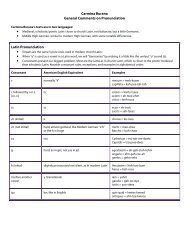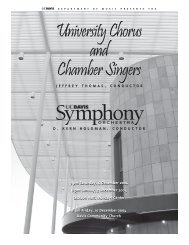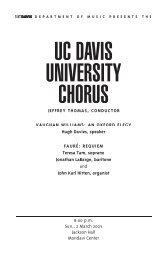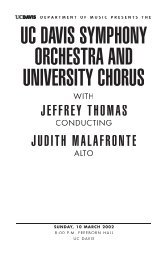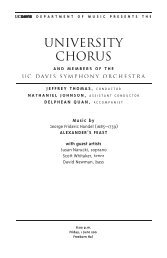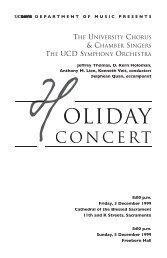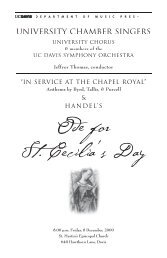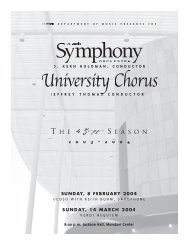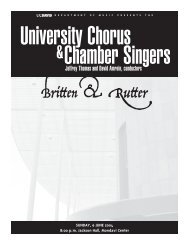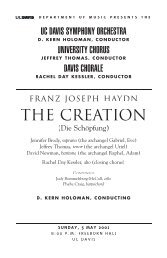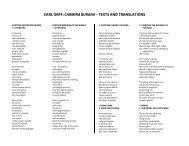S T E P H A N I E - UC Davis University Chorus and Chamber Singers
S T E P H A N I E - UC Davis University Chorus and Chamber Singers
S T E P H A N I E - UC Davis University Chorus and Chamber Singers
Create successful ePaper yourself
Turn your PDF publications into a flip-book with our unique Google optimized e-Paper software.
T H E D E P A R T M E N T O F M U S I C P R E S E N T S<br />
S T E P H A N I E<br />
FRIEDMAN<br />
WITH THE <strong>UC</strong>D SYMPHONY ORCHESTRA AND UNIVERSITY CHORUS<br />
D. KERN HOLOMAN & JEFFREY THOMAS, COND<strong>UC</strong>TORS<br />
SUNDAY, 7 MAY 2000<br />
8:00 P.M. FREEBORN HALL
P R O G R A M<br />
Chorfantasie (Choral Fantasy), op. 80<br />
Ludwig van Beethoven<br />
I. Adagio (1770–1827)<br />
II. Finale: Allegro<br />
Meno allegro (Allegretto)<br />
Allegro molto<br />
Adagio ma non troppo<br />
Marcia assai vivace<br />
Allegro<br />
Allegretto ma non troppo quasi <strong>and</strong>ante con moto<br />
Presto<br />
Antonia Carrillo McCabe, soprano<br />
Cheryl A. Christenson, soprano<br />
Barbara Matwiejczyk, alto<br />
Joseph Palarca, tenor<br />
Brian R<strong>and</strong>all, tenor<br />
Keith A. Rode, bass<br />
Marilyn Swan, piano<br />
Jeffrey Thomas, conductor<br />
Intermission<br />
Das Lied von der Erde (The Song of the Earth)<br />
Gustav Mahler<br />
Das Trinklied vom Jammer der Erde (The Drinking Song of Earthly Woe) (1860–1911)<br />
Der Einsame im Herbst (The Lonely One in Autumn)<br />
Von der Jugend (Of Youth)<br />
Von der Schönheit (Of Beauty)<br />
Der Trunkene im Frühling (The Drunkard in Spring)<br />
Der Abschied (The Farewell)<br />
Stephanie Friedman, mezzo-soprano<br />
Brad Cresswell, tenor<br />
D. Kern Holoman, conductor<br />
8:00 p.m. Sunday, 7 May 2000<br />
Freeborn Hall<br />
2
B I O G R A P H I E S<br />
This will be acclaimed singer Stephanie Friedman’s last public performance. A singer of widely diversified talents, Friedman<br />
regularly performed music ranging from Baroque to contemporary; she was equally at home in recital, concert, <strong>and</strong> opera. In<br />
1987–88 she created the role of Mao’s 2nd Secretary in John Adams’ Nixon in China which she subsequently sung at Houston<br />
Gr<strong>and</strong> Opera, the Brooklyn Academy of Music, the John F. Kennedy Center for the Performing Arts in Washington, D.C., the Los<br />
Angeles Music Center Opera, Netherl<strong>and</strong>s Opera, the Edinburgh Festival, MC93 Bobigny, <strong>and</strong> Frankfurt Opera. Nixon in China<br />
was telecast on PBS’s “Great Performances” for which it won an Emmy, <strong>and</strong> recorded for Nonesuch Records, winning a Grammy.<br />
In 1988 Friedman sang the Récitante in Stravinsky’s Persephone for <strong>UC</strong> Berkeley’s Zellerbach Hall twentieth anniversary. She made<br />
her debut with the Opera Company of Philadelphia as the Turnspit in Dvořák’s Rusalka. In 1989 she made her debut with Nevada<br />
Opera Theatre as Suzuki in Madama Butterfly <strong>and</strong> her debut at the American Music Theater Festival in Philadelphia as Ruth<br />
Lehmann in Paul Dresher’s Power Failure. During the 1989–90 season she appeared with San Francisco Opera in Die Frau Ohne<br />
Schatten, Midsummer Mozart at Davies Symphony Hall, the San Jose Symphony, <strong>and</strong> <strong>Chamber</strong> Music West. She toured with Power<br />
Failure to Minneapolis, Iowa City, San Diego, <strong>and</strong> Los Angeles. 1990–91 brought Nixon in China with the Los Angeles Music<br />
Center Opera, followed by several duo-recitals with baritone Sanford Sylvan.<br />
In 1991, Stephanie Friedman created the roles of Omar <strong>and</strong> Alma Rumor to great acclaim in John Adams’s The Death of Klinghoffer<br />
with the Belgian National Opera in Brussels. The opera was then produced by the Opéra de Lyon, the Vienna Festival, <strong>and</strong> the<br />
Brooklyn Academy of Music. It was staged by San Francisco Opera in fall 1992 <strong>and</strong> the Los Angeles Music Center Opera in fall<br />
1993. Klinghoffer<br />
was recorded in Lyon in 1991, Kent Nagano conducting, on the Nonesuch label. Filling out the 1991–92 season<br />
she appeared in Nixon in China in Paris <strong>and</strong> Frankfurt <strong>and</strong> sang in Charpentier’s Te Deum with the San Francisco Symphony under<br />
Herbert Blomstedt. In July 1992 she sang Mahler’s Das Lied von der Erde at the Mendocino Music Festival. The 1992–93 season<br />
included additional performances of Klinghoffer, Nixon in China, <strong>and</strong> duo recitals with Sanford Sylvan in Boston, Schenectady, <strong>and</strong><br />
Moscow, ID.<br />
Stephanie Friedman has appeared with many of the leading California orchestras including the San Francisco Symphony,<br />
Sacramento Symphony, San Jose Symphony, Oakl<strong>and</strong> Symphony, Fresno Philharmonic, <strong>and</strong> the Stockton Symphony. The San<br />
Francisco Symphony featured her in its January 1983 Vivian Fine Festival, on its New <strong>and</strong> Unusual Music series, twice in its annual<br />
Beethoven Festival, including the 1989 Beethoven Marathon under Michael Tilson Thomas, <strong>and</strong> in its regular subscription season.<br />
In July 1989 she toured Australia <strong>and</strong> French Polynesia with the <strong>UC</strong> <strong>Davis</strong> Symphony Orchestra singing Berlioz’s Cléopâtre <strong>and</strong><br />
Romeó et Juliette in performances honoring the bicentennial of the French Revolution. Over the years, Friedman has appeared with<br />
the <strong>UC</strong>D Symphony Orchestra, D. Kern Holoman, conductor, in an opera here, <strong>and</strong> in recitals.<br />
Friedman’s affinity <strong>and</strong> flair for contemporary music has been recognized by a number of distinguished composers. She was the<br />
soloist for the premiere of Roger Sessions’s When Lilacs Last in the Dooryard Bloom’d; for Andrew Imbrie’s Roethke Songs, <strong>and</strong><br />
for the West Coast premiere of Cambodian composer Chinary Ung’s Mohori. She appeared in the Cabrillo Festival premiere of<br />
Martin’s opera Le Vin Herbé <strong>and</strong> has sung at <strong>Chamber</strong> Music West a number of times. She has performed works of Boulez, George<br />
Crumb, David del Tredici, Edward Lawton, Bartók, Hindemith, Britten, <strong>and</strong> Stravinsky, including Oedipus Rex with the Berkeley<br />
Symphony Orchestra under the direction of Kent Nagano.<br />
In fall 1992 she appeared in two improvisational concerts at the <strong>UC</strong> Berkeley Museum with Matt Heckert, mechanical sound<br />
sculptor. <strong>UC</strong> Berkeley faculty member John Thow wrote Songs for the Earth for Friedman in 1994; they were recorded in 1996 with<br />
San Francisco Contemporary Music Players on the Music <strong>and</strong> Arts label. In 1996 Friedman also recorded San Francisco composer<br />
Peter Scott Lewis’s Where the Heart is Pure with the Berkeley Symphony Orchestra for the New Albion label.<br />
Stephanie Friedman graduated from <strong>UC</strong> Berkeley with a B.A. in French <strong>and</strong> received her M.A. in teaching from Harvard School<br />
of Education. Friedman has been faculty affiliate in voice in the Department of Music, <strong>UC</strong> <strong>Davis</strong>, since 1979; adjunct faculty in<br />
voice at Holy Names College, since 1994; <strong>and</strong> has been teaching privately for many years. After tonight’s performance, she will<br />
continue her voice teaching career, both at <strong>UC</strong> <strong>Davis</strong> <strong>and</strong> privately.<br />
The Illinois-born tenor, Brad Cresswell, recently made his international debut as Canio in I Pagliacci at the Teatro Colón in Buenos<br />
Aires. Recent performances also include Dr. Caius in Falstaff<br />
(with Bryn Terfel in the title role), Zorn in<br />
Die Meistersinger <strong>and</strong><br />
Jacob Schmidt in The Rise <strong>and</strong> Fall of Mahagonny, all with the Lyric Opera of Chicago. Upcoming engagements include covering<br />
the title roles in both Parsifal<br />
<strong>and</strong> Samson et Dalilah for the San Francisco Opera, <strong>and</strong> performing the tenor solos in Beethoven’s<br />
Ninth Symphony with the West Virginia Symphony. Other past roles include Macduff in Macbeth<br />
with the Shreveport Opera,<br />
Cavaradossi in Tosca<br />
with the Eugene Opera <strong>and</strong> the Harrisburgh Opera Association, Dmitri in<br />
Boris Godunov with Long<br />
Beach Opera, Ismaele in Nabucco with the Sarasota Opera, Jeník in The Bartered Bride with Pittsburgh Opera Theatre <strong>and</strong> the<br />
Lake George Opera, Sam in Carlisle Floyd’s Susannah<br />
with Baltimore Opera <strong>and</strong> the Augusta Opera Association, Don José in<br />
Carmen with the New York City Opera National Company, <strong>and</strong> the title role in Verdi’s Otello with the Lake George Opera, in a<br />
performance hailed by Opera News as “remarkably successful, the timbre of the voice clear <strong>and</strong> full.”<br />
3
Cresswell’s concert repertoire includes Verdi’s Requiem, which he has performed with the Santa Fe Symphony, the Boston Civic<br />
Symphony, <strong>and</strong> the New Engl<strong>and</strong> Conservatory Orchestra <strong>and</strong> <strong>Chorus</strong> for their 150th Anniversary (Cresswell is an alumnus<br />
of the New Engl<strong>and</strong> Conservatory), <strong>and</strong> also Verdi’s Hymn of the Nations (with the Sarasota Opera Orchestra <strong>and</strong> <strong>Chorus</strong>). In<br />
addition, he has performed Mahler’s Das Lied von der Erde with the Bridgton Symphony, Puccini’s Messa di Gloria with the Santa<br />
Fe Symphony, <strong>and</strong> Beethoven’s Ninth Symphony with the Richmond Symphony Orchestra <strong>and</strong> the Boston Philharmonic (a<br />
performance recently re-issued by Carlton Classics on CD).<br />
A proponent of contemporary music, Cresswell has performed leading roles in many important operatic premieres. With the Opera<br />
Theatre of Saint Louis (which awarded him their Richard Gaddes career grant in 1992), Cresswell sang the world premiere of<br />
David Carlson’s The Midnight Angel (also performed with the Glimmerglass Opera <strong>and</strong> the Sacramento Opera); also the American<br />
premieres of Judith Weir’s The Vanishing Bridegroom; the revised version of Conrad Susa’s Black River, <strong>and</strong> the final version of<br />
Leonard Bernstein’s C<strong>and</strong>ide, for which Cresswell was cited by Variety for his “charmingly villainous style, sort of a Captain Hook<br />
without the hook.” Other contemporary performances include the world premiere of Anthony <strong>Davis</strong>’s Amistad<br />
with the Lyric<br />
Opera of Chicago, the New York premiere of Sir Michael Tippett’s The Midsummer Marriage with the New York City Opera,<br />
<strong>and</strong> the American premieres of Manfred Gurlitt’s Wozzeck<br />
(Long Beach Opera); Luciano Berio’s<br />
Un Re in ascolto (Lyric Opera of<br />
Chicago) <strong>and</strong> Judith Weir’s Blonde Eckbert (Santa Fe Opera), in a performance that showed “dramatic <strong>and</strong> vocal versatility in his<br />
gifted portrayal” according to the Washington Post.<br />
Cresswell appears on the Phillips recording of Richard Strauss’ Elektra<br />
with the Boston Symphony under Seiji Ozawa, for which<br />
he was hailed as “a major voice in the making” by the Boston Globe. He was a fellowship artist at Tanglewood, where he appeared<br />
in the PBS special Bernstein at 70! <strong>and</strong> was subsequently the youngest of several distinguished alumni invited to perform for that<br />
institution’s 50th anniversary season opening night gala. Cresswell was also a member of the Lyric Opera of Chicago’s Center for<br />
American Artists, where he appeared in many productions including Barber’s Antony <strong>and</strong> Cleopatra (broadcast on PBS) as well as<br />
Hugo Weisgall’s Six Characters in Search of an Author (which was subsequently released by New World Records).<br />
An occasional composer as well, Cresswell’s works have been presented by the Sarasota Opera Association, the Lake George Opera<br />
<strong>Chamber</strong> Music series <strong>and</strong> American Opera Projects in New York. His songs have also been performed in recitals in Chicago, in<br />
Indianapolis, <strong>and</strong> at Carnegie Hall to critical acclaim (by the New York Times).<br />
Marilyn Swan, piano, began her musical studies in Los Angeles with Robert Turner, <strong>and</strong> participated at an early age in master<br />
classes with Rosina Lhevinne at <strong>UC</strong> Berkeley, <strong>UC</strong>LA, <strong>and</strong> the Aspen Music Festival. She is a graduate of the Curtis Institute of<br />
Music in Philadelphia, where she studied with Seymour Lipkin, <strong>and</strong> as an ensemble player, with members of the Guarneri Quartet,<br />
Felix Galimir, Mischa Schneider, <strong>and</strong> Max Rudolf.<br />
The recipient of many scholarships <strong>and</strong> awards, Swan has performed extensively both as a solo recitalist <strong>and</strong> chamber musician,<br />
<strong>and</strong> has appeared with such orcestras as the Los Angeles Philharmonic (with Zubin Mehta <strong>and</strong> Michael Tilson Thomas), the<br />
American Yourth Symphony, California <strong>Chamber</strong> Symphony, Curtis Institute Orchestra, Fresno Philharmonic, Santa Barbara<br />
Symphony, Long Beach Symphony, <strong>and</strong> Caracas (Venezuela) Philharmonic. She was also piano soloist for four years for the Los<br />
Angeles Ballet Company. After performing <strong>and</strong> teaching for many years in Los Angeles, she now lives in <strong>Davis</strong> <strong>and</strong> pursues a<br />
busy performing <strong>and</strong> teaching schedule, both at <strong>UC</strong>D <strong>and</strong> privately. With the <strong>UC</strong>D Symphony Orchestra, she has appeared in<br />
Beethoven’s Fourth Piano Concerto <strong>and</strong> has performed several works with the <strong>University</strong> <strong>Chorus</strong> <strong>and</strong> <strong>Chamber</strong> <strong>Singers</strong> as well as<br />
in chamber music concerts.<br />
Jeffrey Thomas, conductor, is associate professor <strong>and</strong> director of choral ensembles at <strong>UC</strong> <strong>Davis</strong>. Educated at Oberlin Conservatory<br />
<strong>and</strong> The Juilliard School, Thomas has achieved international recognition as music director of the American Bach Soloists, with<br />
whom he has directed <strong>and</strong> conducted recordings of more than 25 cantatas, the Mass in B Minor, The Musical Offering, motets,<br />
chamber music, <strong>and</strong> works by Schütz, Pergolesi, Vivaldi, Haydn, <strong>and</strong> Beethoven. He has performed world-wide <strong>and</strong> with most<br />
major U.S. symphonies <strong>and</strong> Baroque orchestras. His extensive discography of vocal music includes dozens of recordings of major<br />
works for Decca, EMI, Erato, Koch International Classics, Denon, Harmonia Mundi, Smithsonian, Newport Classics, <strong>and</strong><br />
Arabesque. He has presented master classes at the New Engl<strong>and</strong> Conservatory of Music, San Francisco Conservatory, SUNY at<br />
Buffalo, Swarthmore College, <strong>and</strong> Washington <strong>University</strong>, <strong>and</strong> is also an avid exponent of contemporary music.<br />
D. Kern Holoman, conductor, has been professor of music at <strong>UC</strong> <strong>Davis</strong> since 1974 <strong>and</strong> conductor of the <strong>UC</strong>D Symphony Orchestra<br />
since 1978. As a musicologist his research has focused on the life <strong>and</strong> works of Hector Berlioz, <strong>and</strong> he is presently completing a<br />
lengthy study of the Société des Concerts du Conservatoire, 1828–1967. His work in French music was recognized in 1989 with his<br />
appointment as Chevalier of the Order of Arts <strong>and</strong> Letters, Republic of France, <strong>and</strong> this year with his appointment to Officier of<br />
the Order; presently he serves as a member of the international commission planning the three-year Berlioz bicentenary celebration<br />
that began in February of 2000 <strong>and</strong> culminates in December 2003. At <strong>UC</strong> <strong>Davis</strong> Holoman has served as chair of the Departments<br />
of Music <strong>and</strong> Dramatic Art <strong>and</strong> as founding dean of the Division of Humanities, Arts, & Cultural Studies. Born in North Carolina,<br />
Holoman completed his undergraduate studies at Duke <strong>and</strong> earned his Ph.D. from Princeton <strong>University</strong>.<br />
4
Beethoven: Chorfantasie (Choral Fantasy), op. 80<br />
P R O G R A M N O T E S<br />
Improvisation is dependent on two disciplines: composition <strong>and</strong> performance skill. Johann Sebastian Bach <strong>and</strong> Wolfgang<br />
Amadeus Mozart were triply acclaimed as composers, keyboardists, <strong>and</strong> improvisers. It would have been almost impossible<br />
to rival their legacy, as perceived by Beethoven. But he was the perfect well deserving heir. And like Bach <strong>and</strong> Mozart, he<br />
devoted a significant part of his work to the composition of keyboard concertos. In December of 1808, Beethoven hurriedly<br />
composed the Choral Fantasy to conclude a very long concert given at the Theater an der Wien, which included the<br />
premiere of three movements from the Mass in C, the scene <strong>and</strong> aria Ah! Perfido, the Fourth Piano Concerto, the Fifth <strong>and</strong><br />
Sixth Symphonies, <strong>and</strong> a freely improvised fantasy for piano, performed by the composer. In his preparations for the marathon<br />
event, Beethoven sought to write a closing piece, employing all the performers involved. His song Gegenliebe, composed in<br />
1794 or 1795, would serve as the basic material, upon which he would compose variations. But this would be preceded by<br />
another keyboard fantasy, which Beethoven would improvise at the concert. Only much later did he write it down.<br />
It is difficult, even impossible for the human mind to selectively forget sentient experiences. We have heard the Ninth<br />
Symphony, that magnificently eloquent song of mankind, <strong>and</strong> we are compelled to compare it to the Choral Fantasy. The<br />
earlier work is doomed to pale by this comparison; indeed, it seems like a little sibling considering to the scope <strong>and</strong> texture<br />
of the symphony. But if we remember that the Choral Fantasy came first—by about sixteen years—we realize not only<br />
what a completely satisfying work it is, but also that it is truly the model upon which the Ninth is based. The similarities<br />
are obvious to the listener, but scratching beneath the surface reveals a plethora of identical idiomatic idiosyncrasies <strong>and</strong><br />
compositional rhetoric. In particular, his use of relative keys in the two works is the same: the Ninth’s third movement <strong>and</strong><br />
the Adagio ma non troppo section of the Choral Fantasy are both a third below the overall tonality, <strong>and</strong> episodes in both<br />
choral finales make dramatic use of a sudden modulation up a minor third in an otherwise relentlessly major tonality. In the<br />
Choral Fantasy, though, it is the pianist that emerges as hero. The piano plays almost continuously throughout the whole<br />
work, <strong>and</strong>, like the cellos in the Ninth Symphony, presents the Finale’s melodic material first as a healing reward following<br />
the tortured passages of the opening Adagio fantasy (which is just five minutes in length compared to the forty or so minutes<br />
of the Ninth’s first three movements).<br />
—J.T.<br />
Mahler: Das Lied von der Erde (The Song of the Earth)<br />
For soloists (mezzo-soprano, tenor); piccolo, flutes I–III, oboes I–III, English horn, E-flat clarinet, clarinets I–II,<br />
bass clarinet, bassoons I–III, contrabassoon; horns I–IV, trumpets I–III, trombones I–III, tuba; timpani, bass drum,<br />
cymbals, triangle, tambourine, bells; harp, celesta, m<strong>and</strong>olin; strings<br />
Text after Chinese poems of the eighth century, in the German of Hans Bethge: Die chinesische Flöte<br />
(The Chinese Flute), 1907<br />
Composed in 1907–9, mostly summer 1908 in Toblach<br />
First performed (posthumously) 20 November 1911 by the Munich Tonkiinstler Orchestra, Bruno Walter conducting<br />
Published by Universal Edition (Vienna, 1912; piano score in 1911). Inexpensive score: Gustav Mahler: Das Lied von<br />
der Erde in Full Score (New York: Dover, 1988)<br />
Duration: just over one hour<br />
Mahler often described Das Lied von der Erde as a symphony or song-symphony, but purposefully avoided assigning it a<br />
number, so conscious was he of the cases of the three Viennese masters—Beethoven, Schubert, <strong>and</strong> Bruckner—whose<br />
ninth symphonies had been their last. Superstition apart, it made good sense to sidestep the issue of genre, for the usual<br />
terms do not suffice to describe this hybrid of song cycle <strong>and</strong> symphony. The irony is that Mahler’s Ninth was indeed his<br />
last complete work; the tragedy, that he died before hearing either the Ninth or Das Lied von der Erde performed.<br />
In the decline of his physical <strong>and</strong> emotional strength Mahler grew particularly receptive to the sentiments expressed in<br />
these verses from the ancient Chinese. The images are of earthly pleasures—youth, beauty, strong drink, friendship,<br />
sunshine, flowers, <strong>and</strong> breezes. Our opportunity to experience these delights is but fleeting, <strong>and</strong> at the end there is death.<br />
Yet in the certainty that the earth will blossom anew each spring, forever, there is to be found both a higher wisdom <strong>and</strong> a<br />
higher pleasure.<br />
5
The Drinking Song of Earthly Woe is in three stanzas for tenor, each concluding with the refrain “Dunkel ist das Leben, ist<br />
der Tod” (Dark is life; dark is death), a little higher each time. The proposition is familiar: drink, sing, <strong>and</strong> make merry, for<br />
though the sky will always be blue <strong>and</strong> the spring is certain to blossom, we mortals have less than a hundred years to enjoy<br />
it. The orchestral introduction is emphatic <strong>and</strong> worldly <strong>and</strong> the overall scoring brilliant, emphasizing high registers in both<br />
the orchestral <strong>and</strong> vocal lines. Between the second <strong>and</strong> third stanzas comes an orchestral interlude of gripping symbolism—<br />
the blossoming continues without the singer. Over the course of the movement we encounter elements that characterize<br />
the work as a whole: freely varied strophes, mutation of tonality as the song progresses, <strong>and</strong> a prominent recurring melodic<br />
descent (a descending sixth).<br />
While the tenor’s three songs are lusty, those for the alto are wistful <strong>and</strong> pensive. In The Lonely One in Autumn nature<br />
succumbs to its annual fading, to mists, frost, <strong>and</strong> icy wind, <strong>and</strong> the singer weeps in loneliness, seeking only rest <strong>and</strong> perhaps<br />
the sun to dry her tears. The scoring is bare: long, sad turns in the solo lines are set over almost continuously flowing eighth<br />
notes, <strong>and</strong> the solo part progresses in stepwise, rather resigned, quarter <strong>and</strong> half notes. At the invocation to the “sun of love”<br />
there is an outpouring from harp <strong>and</strong> winds; elsewhere all is cold.<br />
Of Youth, for the tenor, is a true chinoiserie: at the end of a jade bridge to the isl<strong>and</strong> in a little pond st<strong>and</strong>s a pavilion<br />
of green <strong>and</strong> white porcelain. Friends drink, chat, <strong>and</strong> write poetry in the gazebo, <strong>and</strong> all is mirrored on the pond’s calm<br />
surface. The music has oriental melodic twists <strong>and</strong> an orchestration dominated by flutes <strong>and</strong> piccolos. You will inevitably<br />
compare the effect with that of the pagoda movement in Ravel’s Mother Goose Suite, composed a few months later.<br />
The most fetching attribute of youth is surely beauty. In the alto’s second song, Of Beauty, maidens gather blossoms at the<br />
river bank <strong>and</strong> bask in golden sun. Young men pass by on horseback. One of the steeds shies <strong>and</strong> gallops, <strong>and</strong> the loveliest of<br />
the girls longs for its gallant rider. The music, still of oriental nuance, is playful, with the thunder of horse <strong>and</strong> rider one of<br />
the few big tuttis to be found in the center movements.<br />
Intoxication is at issue in the tenor’s last song, The Drunkard in Spring, The antidote to life’s miseries, he argues, is strong<br />
drink <strong>and</strong> the drugged sleep that inevitably follows. A bird warbles of the springtime, but the singer would rather be drunk:<br />
“What has spring to do with me?”<br />
Now comes The Farewell, a profound thirty-minute treatment of two related poems (“Waiting for a Friend” <strong>and</strong> “The<br />
Farewell of a Friend”) that concludes Das Lied von der Erde by returning it to the cosmic gravities of the first movement. For<br />
mezzo-sopranos this tour de force is the equal of Wagner’s Liebestod, with which it has a good deal in common—poignant,<br />
bittersweet, brimming with the kind of nostalgia you also hear in Richard Strauss’s Four Last Songs. From the first measures,<br />
where the oboe wends its plaint over the toll of tam-tam <strong>and</strong> low orchestral Cs (essentially the lowest sounds an orchestra<br />
can make), you know you are in for stark misery. These motives are soon joined by two others: falling chromatic sighs<br />
in pairs of winds <strong>and</strong> a faster, more curvaceous chromatic descent by sixteenth notes. Tragedy is not so much at issue as<br />
resignation to fate: it is nightfall, the close of things; <strong>and</strong> as the world goes off to its well-earned slumber, the singer waits<br />
in utter darkness for the last meeting with a friend. The friend finally arrives <strong>and</strong> dismounts, <strong>and</strong> they share the draught<br />
of farewell. The friend sets forth toward the mountains, there to find peace for a lonely heart. All the cycle’s subject<br />
matter—beauty, drink, youth—commingles, then concludes with the reminder that the earth will blossom again—forever…<br />
forever…<br />
Here lies Mahler’s sustained <strong>and</strong> wrenching treatment of sentiments that lie deep in every listener’s soul, especially during<br />
the orchestral episode that represents the long wait in the dark (after the line “O beauty! O, eternal love- <strong>and</strong> life-drunk<br />
world!”). Note, too, the sonority of the m<strong>and</strong>olin (“I walk with my lute, hither <strong>and</strong> yon,” says the text), which went on to<br />
become something of a vogue with the Viennese composers.<br />
—DKH<br />
6
T E X T S A N D T R A N S L A T I O N S<br />
B E E T H O V E N : C H O R A L F A N T A S Y , o p . 8 0<br />
translated by Christoph Kuffner<br />
Chorfantasie<br />
Schmeichelnd hold und lieblich klingen<br />
Unsers Lebens Harmonien,<br />
Und dem Schönheitssinn entschwingen<br />
Blumen sich, die ewig blühn.<br />
Fried und Freude gleiten freundlich<br />
Wie der Wellen Wechselspiel;<br />
Was sich drängte rauh und feindlich,<br />
Ordnet sich zu Hochgefühl.<br />
Wenn der Töne Zauber walten<br />
Und des Wortes Weihe spricht,<br />
Muß sich Herrliches gestalten,<br />
Nacht und Stürme werden Licht.<br />
Äußre Ruhe, innre Wonne<br />
Herrschaft für den Glücklichen.<br />
Doch der Künste Frühlingssonne<br />
Läßt aus beiden Licht entstehn.<br />
Großes, das ins Herz gedrungen,<br />
Blüht dann neu und schön empor,<br />
Hat ein Geist sich aufgeschwungen,<br />
Hallt ihm stets ein Geisterchor.<br />
Nehmt denn hin, ihr schönen Seelen,<br />
Froh die Gaben schöner Kunst,<br />
Wenn sich Lieb und Kraft vermählen,<br />
Lohnt dem Menschen Göttergunst.<br />
Choral Fantasy<br />
Caressing, fair <strong>and</strong> lovely are the sounds<br />
of harmony in our life,<br />
<strong>and</strong> from the sense of beauty<br />
spring flowers that bloom for ever.<br />
Peace <strong>and</strong> joy flow delightfully,<br />
like the alternating play of waves;<br />
what were harsh <strong>and</strong> hostile pressures<br />
are transmuted to elation.<br />
When the magic of sound holds sway<br />
<strong>and</strong> words bring inspiration,<br />
glorious things must appear,<br />
darkness <strong>and</strong> turmoil become light.<br />
The happy man is ruled<br />
by calm without, bliss within.<br />
But the Springtime sun of the arts<br />
causes light to emanate from both.<br />
Greatness compact in the heart<br />
then blooms forth, new <strong>and</strong> lovely;<br />
when a spirit soars aloft<br />
a chorus of spirits resounds forever to it.<br />
Then, ye lovely souls, accept<br />
with gladness the gifts of beauteous art.<br />
When love <strong>and</strong> strength are united,<br />
divine grace rewards mankind.<br />
7
D A S L I E D V O N D E R E R D E ( T H E S O N G O F T H E E A R T H )<br />
After old Chinese poems, translated by Hans Bethge<br />
Das Trinkleid vom Jammer der Erde<br />
Schon winkt der Wein im goldnen Pokale,<br />
Doch trinkt noch nicht, erst sing ich euch ein Lied!<br />
Das Lied vom Kummer soll auflachend in die Seele<br />
euch klingen.<br />
Wenn der Kummer naht, liegen wüst die<br />
Gärten der Seele,<br />
Welkt hin und stirbt die Freude, der Gesang.<br />
Dunkel ist das Leben, ist der Tod.<br />
Herr dieses Hauses!<br />
Dein Keller birgt die Fülle des goldenen Weins!<br />
Hier diese Laute nenn ich mein!<br />
Die Laute schlagen und die Gläser leeren,<br />
Das sind die Dinge, die zusammen passen.<br />
Ein voller Becher Weins zur rechten Zeit<br />
Ist mehr wert als alle Reiche dieser Erde!<br />
Dunkel ist das Leben, ist der Tod.<br />
Das Firmament blaut ewig und die Erde<br />
Wird lange fest stehn und aufblühn im Lenz.<br />
Du aber, Mensch, wie lang lebst denn du?<br />
Nicht hundert Jahre darfst du dich ergötzen<br />
An all dem morschen T<strong>and</strong>e dieser Erde!<br />
Seht dort hinab! Im Mondschein auf den Gräbern<br />
Hockt eine wild-gespenstische Gestalt —<br />
Ein Aff ist’s! Hört ihr, wie sein Heulen<br />
Hinausgeht in den süßen Duft des Lebens!<br />
Jetzt nehmt den Wein! Jetzt ist es Zeit, Genossen<br />
Leert eure goldnen Becher zu Grund!<br />
Dunkel ist das Leben, ist der Tod!<br />
Der Einsame im Herbst<br />
Herbstnebel wallen bläulich überm See;<br />
Vom Reif bezogen stehen alle Gräser;<br />
Man meint’, ein Künstler habe Staub von Jade<br />
Über die feinen Blüten ausgestreut.<br />
Der süße Duft der Blumen ist verflogen;<br />
Ein kalter Wind beugt ihre Stengel nieder.<br />
Bald werden die verwelkten, goldnen Blätter<br />
Der Lotosblüten auf dem Wasser ziehn.<br />
Mein Herz ist müde. Meine kleine Lampe<br />
Erlosch mit Knistern; es gemahnt mich an den Schlaf.<br />
Ich komm zu dir, traute Ruhestätte!<br />
Ja, gib mir Ruh, ich hab Erquickung not!<br />
Ich weine viel in meinen Einsamkeiten.<br />
Der Herbst in meinem Herzen währt zu lange<br />
Sonne der Liebe, willst du nie mehr scheinen,<br />
Um meine bittern Tränen mild aufzutrocknen?<br />
The Drinking Song of Earthly Woe<br />
Already the wine beckons in the golden goblet,<br />
But do not drink yet: first I will sing you a song!<br />
The song of sorrow shall sound laughingly<br />
in your soul.<br />
When sorrow draws near, it lays waste to the<br />
gardens of the soul,<br />
Joy <strong>and</strong> song wither <strong>and</strong> die.<br />
Dark is life, is death.<br />
Master of this house!<br />
Your cellar is filled with golden wine!<br />
Here this lute I call my own!<br />
To strike the lute <strong>and</strong> to drain the glass<br />
Are things that go well together.<br />
A full cup of wine at the right time<br />
Is worth more than all the empires of this world!<br />
Dark is life, is death.<br />
The firmament is ever blue, <strong>and</strong> the earth<br />
Will long st<strong>and</strong> firm <strong>and</strong> blossom in spring.<br />
But you, Man: how long do you live?<br />
Not even a hundred years may you divert yourself<br />
With all the brittle baubles of this earth.<br />
Look down there! In the moonlight on the graves<br />
Cowers a wild, ghostly form.<br />
It is a monkey! Do you hear how his howling<br />
Pierces into the sweet scent of life?<br />
Now take up the wine: now it is time, friends.<br />
Empty your golden goblets to the bottom!<br />
Dark is life, is death.<br />
The Lonely One in Autumn<br />
Autumn mists drift in blue over the lake;<br />
All the grass is covered with hoarfrost;<br />
One would think an artist had scattered jade-dust<br />
Over the delicate blossoms.<br />
The flowers’ sweet scent is gone;<br />
A cold wind bends their stems.<br />
Soon the withered golden leaves<br />
Of the lotus blossoms will float by on the water.<br />
My heart is weary. My little lamp<br />
Has sputtered out, it summons me to sleep.<br />
I come to you, dear resting place!<br />
Yes, give me rest, I need to be refreshed.<br />
I weep much in my loneliness.<br />
The autumn in my heart endures too long.<br />
Sun of love, will you never shine again<br />
Gently to dry my bitter tears?<br />
8
Von der Jugend<br />
Mitten in dem kleinen Teiche<br />
Steht ein Pavillon aus grünem<br />
Und aus weißem Porzellan.<br />
Wie der Rücken eines Tigers<br />
Wölbt die Brücke sich aus Jade<br />
Zu dem Pavillon hinüber.<br />
In dem Häuschen sitzen Freunde,<br />
Schön gekleidet, trinken, plaudern,<br />
Manche schreiben Verse nieder.<br />
Ihre seidnen Ärmel gleiten<br />
Rückwärts, ihre seidnen Mützen<br />
Hocken lustig tief im Nacken.<br />
Auf des kleinen Teiches stiller<br />
Wasserfläche zeigt sich alles<br />
Wunderlich im Spiegelbilde.<br />
Alles auf dem Kopfe stehend<br />
In dem Pavillon aus grünem<br />
Und aus weißem Porzellan;<br />
Wie ein Halbmond steht die Brücke,<br />
Umgekehrt der Bogen. Freunde,<br />
Schön gekleidet, trinken, plaudern.<br />
Von der Schönheit<br />
Junge Mädchen pflücken Blumen,<br />
Pflücken Lotosblumen an dem Uferr<strong>and</strong>e<br />
Zwischen Büschen und Blättern sitzen sie,<br />
Sammeln Blüten in den Schoß und rufen<br />
Sich ein<strong>and</strong>er Neckereien zu.<br />
Goldne Sonne webt um die Gestalten<br />
Spiegelt sie im blanken Wasser wider,<br />
Sonne spiegelt ihre schlanken Glieder,<br />
Ihre süßen Augen wider.<br />
Und der Zephir hebt mit Schmeichelkosen das Gewebe<br />
Ihrer Ärmel auf; führt den Zauber<br />
Ihrer Wohlgerüche durch die Luft.<br />
O sieh, was tummeln sich für schöne Knaben<br />
Dort an dem Uferr<strong>and</strong> auf mut’gen Rossen?<br />
Weithin glänzend wie die Sonnenstrahlen,<br />
Schon zwischen dem Geäst der grünen Weiden<br />
Trabt das jungfrische Volk einher!<br />
Das Roß des einen wiehert fröhlich auf<br />
Und scheut und saust dahin,<br />
Über Blumen, Gräser, wanken hin die Hufe,<br />
Sie zerstampfen jäh im Sturm die hingesunknen Blüten,<br />
Heil! Wie flattern im Taumel seine Mahnen,<br />
Dampfen heiß die Nüstern!<br />
Goldne Sonne webt um die Gestalten,<br />
Spiegelt sie im blanken Wasser wider.<br />
Of Youth<br />
In the middle of the little pool<br />
St<strong>and</strong>s a pavillion of green<br />
And white porcelain.<br />
Like the back of a tiger,<br />
The jade bridge arches<br />
Over to the pavillion.<br />
In the little house sit friends;<br />
Beautifully dressed, they drink <strong>and</strong> talk;<br />
Some are writing verses.<br />
Their silk sleeves slide<br />
Backwards, their silk caps<br />
Perched lustily back on their heads.<br />
On the little pool’s still<br />
Water-surface, everything is<br />
Wonderously mirrored.<br />
Everything st<strong>and</strong>s on its head<br />
In the pavillion of green<br />
And white porcelain;<br />
Like a half-moon st<strong>and</strong>s the bridge,<br />
Its arch inverted. Friends,<br />
Beautifully dressed, are drinking, talking.<br />
Of Beauty<br />
Young girls are picking flowers,<br />
Picking lotus flowers by the riverbank.<br />
Among bushes <strong>and</strong> leaves they sit,<br />
Gather blossoms in their laps, <strong>and</strong> call<br />
To one another in their banter.<br />
The golden sun plays around them,<br />
Mirrors them in the shining water.<br />
The sun mirrors their slender limbs<br />
And their sweet eyes.<br />
And the soft breeze caressingly lifts the fabric<br />
Of their sleeves, <strong>and</strong> bears the magic<br />
Of their perfumes through the air.<br />
O see: what h<strong>and</strong>some boys are these, frolicking<br />
By the riverbank on mettlesome horses?<br />
Gleaming in the distance, like the sunbeams,<br />
Between the green willow-branches.<br />
These supple young men are already cantering!<br />
One of their horses neighs merrily,<br />
Rears, <strong>and</strong> plunges on;<br />
Over flowers <strong>and</strong> grass the hooves fly,<br />
Trampling, in their stormy passage, the fallen blossoms.<br />
Heigh! How its mane flutters in its frenzy,<br />
How its nostrils steam!<br />
The golden sun plays around these figures,<br />
Mirrors them in the shining water.<br />
9
Und die schönste von den Jungfraun sendet<br />
Lange Blicke ihm der Sehnsucht nach.<br />
Ihre stolze Haltung ist nur Verstellung.<br />
In dem Funkeln ihrer großen Augen,<br />
In dem Dunkel ihres beißen Blicks<br />
Schwingt klagend noch die Erregung ihres Herzens nach.<br />
Der Trunkene im Frühling<br />
Wenn nur ein Traum das Leben ist,<br />
Warum dann Müh und Plag?<br />
Ich trinke, bis ich nicht mehr kann,<br />
Den ganzen, lieben Tag!<br />
Und wenn ich nicht mehr trinken kann,<br />
Weil Kehl und Seele voll,<br />
So tauml’ich bis zu meiner Tür<br />
Und schlafe wundervoll!<br />
Was hör ich beim Erwachen? Horch!<br />
Ein Vogel singt im Baum.<br />
Ich frag ihn, ob schon Frühling sei.<br />
Mir ist als wie im Traum.<br />
Der Vogel zwitschert: Ja! Der Lenz<br />
Ist da, sei kommen über Nacht!<br />
Aus tiefstem Schauen lausch ich auf,<br />
Der Vogel singt und lacht!<br />
Ich fülle mir den Becher neu<br />
Und leer ihn bis zum Grund,<br />
Und singe, bis der Mond erglänzt<br />
Am schwarzen Firmament!<br />
Und wenn ich nicht mehr singen kann,<br />
So schlaf ich wieder ein.<br />
Was geht mich denn der Frühling an?<br />
Laßt mich betrunken sein!<br />
And the loveliest of the girls<br />
Looks after him with longing.<br />
Her proud bearing is only pretense.<br />
The fire of her large eyes,<br />
The darkness of their passionate gaze,<br />
Still throb, lamenting, with the agitation of her heart.<br />
The Drunkard in Spring<br />
If life is only a dream<br />
Why should there be trouble <strong>and</strong> care?<br />
I drink till I can drink no more,<br />
All the livelong day!<br />
And when I can drink no more,<br />
Since throat <strong>and</strong> soul are full,<br />
Then I stagger to my door<br />
And sleep marvelously well.<br />
What do I hear when I wake? Hark!<br />
A bird sings in the tree.<br />
I ask it if spring has come.<br />
It all seems like a dream.<br />
The bird twitters: Yes! The spring<br />
Is here: it came over night!<br />
Lost in gazing, I listen:<br />
The bird sings <strong>and</strong> laughs!<br />
I fill my my cup again<br />
And empty it to the bottom,<br />
And sing, until the moon begins to glance<br />
Out of the black skies.<br />
And when I can sing no more<br />
I go to sleep again.<br />
What do I care for the spring?<br />
Let me be drunk!<br />
10
Der Abschied<br />
Die Sonne scheidet hinter dem Gebirge.<br />
In alle Täler steigt der Abend nieder<br />
Mit seinen Schatten, die voll Kühlung sind.<br />
O sieh! Wie eine Silberbarke schwebt<br />
Der Mond am blauen Himmelssee herauf,<br />
Ich spüre eines feinen Windes Wehn<br />
Hinter den dunklen Fichten!<br />
Der Bach singt voller Wohllaut durch das Dunkel.<br />
Die Blumen blassen im Dämmerschein.<br />
Die Erde atmet voll von Rüh und Schlaf.<br />
Alle Sehnsucht will nun träumen,<br />
Die müden Menschen gehn heimwärts,<br />
Um im Schlaf vergeßnes Glück<br />
Und Jugend neu zu lernen!<br />
Die Vögel hocken still in ihren Zweigen.<br />
Die Welt schläft ein!<br />
Es wehet kühl im Schatten meiner Fichten.<br />
Ich stehe hier und harre meines Freundes;<br />
Ich harre sein zum letzten Lebewohl.<br />
Ich sehne mich, o Freund, an deiner Seite<br />
Die Schönheit dieses Abends zu genießen.<br />
Wo bleihst du? Du laßt mich lang allein!<br />
Ich w<strong>and</strong>le auf und nieder mit meiner Laute<br />
Auf Wegen, die von weichem Grase schwellen.<br />
O Schönheit! O ewigen Liebens- Lebenstrunkne Welt!<br />
Er stieg vom Pferd und reichte ihm den Trunk<br />
Des Abschieds dar. Er fragte ihn, wohin<br />
Er führe und auch warum es müßte sein.<br />
Er sprach, und seine Stimme war umflort:<br />
“Du mein Freund,<br />
Mir war auf dieser Welt das Glück nicht hold!<br />
Wohin ich geh? Ich geh, ich w<strong>and</strong>re in die Berge.<br />
Ich suche Rühe für mein einsam Herz.<br />
Ich w<strong>and</strong>le nach der Heimat, meiner Stätte.<br />
Ich wrede niemals in die Ferne schweifen.<br />
Still ist mein Herz und harret seiner Stunde!<br />
Die liebe Erde allüberall<br />
Blüht auf im Lenz und grünt<br />
Auf’s neu! Allüberall und ewig<br />
Blauen licht die Fernen!<br />
Ewig… ewig…”<br />
The Farewell<br />
The sun goes down behind the mountain,<br />
Into all the valleys the evening descends<br />
And brings cooling shades.<br />
O see! Like a silver bark<br />
The moon floats up the blue lake of heaven.<br />
I feel a gentle breeze stirring<br />
Behind the dark spruce.<br />
The brook sings melodiously through the darkness.<br />
The flowers grow pale in the gloaming.<br />
The earth is breathing, full of peace <strong>and</strong> sleep.<br />
All longing now turns in dreams,<br />
Tired men make for home,<br />
In sleep to recapture forgotten happiness<br />
And youth!<br />
The birds cower silently in the branches.<br />
The world is falling asleep.<br />
A cool wind blows in the shadow of my spruce.<br />
I st<strong>and</strong> here waiting for my friend;<br />
I wait to bid him a last farewell.<br />
I long, my friend, at your side<br />
To enjoy the beauty of this evening.<br />
Where do you linger? You have left me alone so long!<br />
I w<strong>and</strong>er up <strong>and</strong> down with my lute<br />
On paths soft with swelling grass.<br />
O beauty! O eternal love- <strong>and</strong> life-drunk world!<br />
He dismounted <strong>and</strong> proffered him the drink<br />
Of farewell. He asked where<br />
He was going <strong>and</strong> why it had to be.<br />
He said, <strong>and</strong> his voice trembled:<br />
“O my friend,<br />
In this world fortune did not smile on me.<br />
Where I am going? I go, I w<strong>and</strong>er into the mountains.<br />
I seek peace for my lonely heart.<br />
I am making for home, for my resting place.<br />
I will never roam into strange l<strong>and</strong>s.<br />
My heart is still <strong>and</strong> bides its time.<br />
The dear earth everywhere<br />
Blossoms in spring <strong>and</strong> grows green<br />
Anew! Everywhere, for ever,<br />
Blue lights the horizon!<br />
Ever… ever…”<br />
11
T H E U C D S Y M P H O N Y O R C H E S T R A<br />
1 9 9 9 – 2 0 0 0<br />
D. Kern Holoman, conductor<br />
Angelo Moreno <strong>and</strong> Kenneth Veit, assistant conductors<br />
Rebecca Brover, manager<br />
Violin<br />
Cynthia Bates, concertmaster<br />
Ginger Cervantes,<br />
associate concertmaster<br />
Angelo Moreno,<br />
principal violin II<br />
Shari Gueffroy, assistant<br />
principal<br />
Kate Branscomb<br />
Clairelee L. Bulkley<br />
Joan Crow<br />
Lindsay Daine<br />
Elena Delacy<br />
Anna Filippova<br />
Fawzi Haimor<br />
Frances Hammock<br />
Catherine Heusner<br />
Emily Jones<br />
Cheryl Kang<br />
Barry Kersting<br />
Hung Lam<br />
John Lin<br />
Victor Lin<br />
Alisa Meany<br />
Eileen Mols<br />
Raphael Moore<br />
Jennifer Osborn<br />
N<strong>and</strong>ini Parthasarathy<br />
Ingrid Peters<br />
Judy Riggs<br />
Jonathan Siekmann<br />
Alice Tackett<br />
Dan Woo<br />
Dean Woo<br />
Viola<br />
David Calderon, principal<br />
Stephen Abraham<br />
Marianne Batchelder<br />
Dan Chitwood<br />
James Een<br />
Ilia Howard<br />
Jennifer Kane<br />
Emi Ludemann<br />
Melissa Lyans<br />
Jocelyn Morris<br />
Michael Reid<br />
Kathryn Snyder<br />
Cello<br />
Esther Wright, principal<br />
Aaron Benavidez<br />
Susan Lamb Cook<br />
Justine Eckersley<br />
Alex Klassen<br />
Bonnie Li<br />
Emily Morris<br />
Judy Rummelsburg<br />
Heather Scott<br />
Double Bass<br />
Katherine Nepo, principal<br />
Cheryl Adams<br />
Greg Brucker<br />
Thomas Derthick<br />
Erica White<br />
Greg McCall<br />
M<strong>and</strong>olin<br />
Greg Brucker<br />
Flute<br />
Susan Monticello, principal<br />
Ellen Avery<br />
Yuko Hoshino<br />
Marjorie Phillips<br />
Oboe<br />
Robert Volmer, principal<br />
Timothy Broesamle<br />
Jill Ims<strong>and</strong><br />
Dianne Lehmann<br />
Clarinet<br />
Richard Levine,<br />
co-principal<br />
Trevor Murphy,<br />
co-principal<br />
Elaine Icban<br />
Jack Kane<br />
Bassoon<br />
Joshua Mast, principal<br />
Diana Keen<br />
Contrabassoon<br />
Maryll Goldsmith<br />
French Horn<br />
Christina Vredevoe, principal<br />
Rebecca Dudovitz<br />
Philip Gahagan<br />
Linette Lina<br />
Lynne Swant<br />
Trumpet<br />
Andrew Mollner, principal<br />
Toby Glik<br />
Kristin Simpson<br />
Kenneth Veit<br />
Trombone<br />
Michael Malone, principal<br />
Forest Bohrer<br />
Rebecca A. Brover<br />
Jim Fessenden<br />
Tuba<br />
Robert Rucker<br />
Percussion<br />
Ryan Friedman, principal<br />
Marianne Chatterton<br />
Jihan Ejan<br />
Paul D. Terry<br />
Celesta<br />
Delphean Quan<br />
Harp<br />
Agnes Lee<br />
Christian Schunck<br />
12
U N I V E R S I T Y C H O R U S<br />
1 9 9 9 – 2 0 0 0<br />
Jeffrey Thomas, conductor<br />
Anthony M. Lien, assistant conductor<br />
Delphean Quan, accompanist<br />
Sopranos<br />
Antonia Carrillo McCabe<br />
Serena Chan<br />
Takyan Chan<br />
Brea Mina Cherné<br />
Sophia Chin<br />
Cheryl Christenson<br />
Diane Cooper<br />
Jacqueline Curran<br />
JoAnne Delfino<br />
Sarah Gruneisen<br />
Dani Haack<br />
Vanessa Kirkup<br />
Airy Krich-Brinton<br />
Yan Yan Lam<br />
Opal Lawler<br />
Lennifer Lim<br />
Cheryl Loehr<br />
Margaret E. McClell<strong>and</strong><br />
Heather Myers<br />
Elizabeth Parks<br />
Elizabeth Pickett<br />
Rhiannon Powell<br />
Elenka Proulx<br />
Amy Rominger<br />
Monica Stoner<br />
Paula Stoner<br />
Katy Williams<br />
Cindy Wilson<br />
Altos<br />
Anna M-R Axiaq<br />
Vanessa Ayala-Pech<br />
Erin Barker<br />
Pirawan Boonmanunt<br />
Sarah Brickey<br />
Raquel Caron<br />
Veronica Cervantes<br />
Christine Chavez<br />
Shirley Cheng<br />
Nicky Costanzo<br />
Meghan Eberhardt<br />
Sara Feldman<br />
Jeanne Fishback<br />
Elisa Fon<br />
Monica Garcia<br />
Maryann Hulsman<br />
Kim Irish<br />
Lisa Jacobson<br />
Elaine Kim<br />
JoAnn Kohlbr<strong>and</strong><br />
Gina Marino<br />
Gigi Owen<br />
Mina Rohani<br />
Vanessa Saliendra<br />
Karis Smith<br />
Jasmine Summerset<br />
Mary-Ann Tan<br />
Megan Taylor<br />
Nami Tsumura<br />
Kelly Vial<br />
Mishell Villott<br />
Brooke Wagstaff<br />
Tenors<br />
J. A. Borum<br />
S. D. Geller<br />
Anders Hansson<br />
J. S. Palarca<br />
D. M. Pollock<br />
B. P. R<strong>and</strong>all<br />
Basses<br />
Lucas Ainsworth<br />
John Baker<br />
Nick Barbulesco<br />
Jonathon Chow<br />
Brian Coburn<br />
Conor Egan<br />
Bryce Hathaway<br />
Raymond Lee<br />
Carl Lischeske<br />
Bryan Martin<br />
Noca<br />
Keith Rode<br />
Steven A. Rosenau<br />
Aaron Sathrum<br />
David Yaranon<br />
13
U C D D E P A R T M E N T O F M U S I C<br />
U P C O M I N G E V E N T S -<br />
WEDNESDAY, 10 MAY<br />
Noon Concert: <strong>University</strong> Concert B<strong>and</strong>,<br />
Jonathan Elkus, conductor.<br />
12:05 p.m. West Quad. Free.<br />
WEDNESDAY, 10 MAY<br />
<strong>University</strong> Concert B<strong>and</strong>, Jonathan Elkus,<br />
conductor, <strong>and</strong> Yolo County Concert B<strong>and</strong>,<br />
John Moore, Jr., conductor, perform at the<br />
<strong>Davis</strong> Farmers Market.<br />
5:30 p.m. Central Park. <strong>Davis</strong>. Free.<br />
THURSDAY, 11 MAY<br />
Noon Concert: Ellen Gronningen, violin, <strong>and</strong><br />
Benjamin Morss, piano. Works by Brahms,<br />
Debussy, <strong>and</strong> Morss.<br />
12:05 p.m. 115 Music Building. Free.<br />
FRIDAY, 12 MAY<br />
Baroque Gems: <strong>UC</strong>D Baroque Ensemble,<br />
Phebe Craig, director <strong>and</strong> harpsichord.<br />
8:00 p.m. St. Martin’s Episcopal Church,<br />
640 Hawthorn Lane, <strong>Davis</strong>. Suggested<br />
donation $6/students <strong>and</strong> children $3.<br />
SUNDAY, 14 MAY<br />
Vocal <strong>and</strong> Instrumental Music by Women<br />
Composers, including Clara Schumann,<br />
Elisabeth-Claude Jacquet de la Guerre, Amy<br />
Beach, Barbara Strozzi, <strong>and</strong> others.<br />
4:00 p.m., 115 Music Building.<br />
Special free concert.<br />
Supported with a grant from the President’s<br />
Undergraduate Fellowship.<br />
THURSDAY, 18 MAY<br />
Noon Concert: Baroque chamber<br />
concert with Angelo Moreno, violin,<br />
Justine Eckersley, cello, <strong>and</strong> Phebe Craig,<br />
harpsichord.<br />
12:05 p.m. 115 Music Building. Free.<br />
SATURDAY, 20 MAY<br />
Empyrean Ensemble, Ross Bauer, director.<br />
New Music from <strong>Davis</strong>. New Works by <strong>Davis</strong><br />
Composers Anne Guzzo, Helena Michelson,<br />
Joël Lindheimer, Susan Templeton, Drew<br />
Wheeler, <strong>and</strong> Ross Bauer, featuring new<br />
faculty composer, Yu-Hui Chang, guest<br />
conductor.<br />
8:00 p.m. <strong>Davis</strong> Art Center, 1919 F Street at<br />
Covell. General admission $10/students <strong>and</strong><br />
children $5.<br />
7:20 p.m. Free pre-performance lecture with<br />
the composers.<br />
Co-sponsored with <strong>University</strong> Cultural Programs.<br />
SUNDAY, 21 MAY<br />
<strong>UC</strong>D Early Music Ensemble, David Nutter,<br />
director.<br />
8:00 p.m. St. Martin’s Church, 640 Hawthorn<br />
Lane, <strong>Davis</strong>.<br />
Suggested donation $6/students <strong>and</strong><br />
children $3.<br />
Supported in part by the Ed <strong>and</strong> Elen Witter Endowment.<br />
MAY 18-21, 24-25, JUNE 1-4, 2000<br />
Cabaret, music <strong>and</strong> lyrics by John K<strong>and</strong>er<br />
<strong>and</strong> Fred Ebb, book by Joe Masteroff. The<br />
Departments of Theatre & Dance <strong>and</strong> Music<br />
present this newly revised version of the<br />
Tony Award-winning musical, complete with<br />
two new songs, that is currently enjoying<br />
a successful Broadway run. Sheldon<br />
Deckelbaum, director; D. Kern Holoman <strong>and</strong><br />
Kenneth Veit, music directors; members of<br />
the <strong>UC</strong>D Symphony Orchestra.<br />
Main Theatre. 8:00 p.m. (except 2:00 p.m.<br />
on Sundays, 21 May <strong>and</strong> 4 June). Preview<br />
performance on Thursday, 18 May at 8 p.m.<br />
For ticket information, please contact the<br />
Campus Box Office at 530.752.1915. (Tickets<br />
are $7 students, $12 general.) $6 tickets for<br />
preview.<br />
Co-sponsored by the Department of Theatre <strong>and</strong> Dance.<br />
WEDNESDAY, 24 MAY<br />
Paul Nagel Piano Trio (NLS Trio) with Paul<br />
Nagel, piano, John Shifflett, bass, <strong>and</strong> Jason<br />
Lewis, drums; <strong>and</strong> the <strong>UC</strong>D Jazz B<strong>and</strong>,<br />
Mike McMullen, director.<br />
8:00 p.m. Varsity Theatre. 616 Second<br />
Street, <strong>Davis</strong>.<br />
General admission $10/students<br />
<strong>and</strong> children $5.<br />
THURSDAY, 25 MAY<br />
Noon Concert: Voice Student Recital.<br />
12:05 p.m. 115 Music Building. Free.<br />
FRIDAY, 26 MAY<br />
<strong>University</strong> <strong>Chorus</strong> <strong>and</strong> <strong>Chamber</strong> <strong>Singers</strong>,<br />
Jeffrey Thomas, conductor. Works by Mozart<br />
<strong>and</strong> H<strong>and</strong>el.<br />
8:00 p.m. Freeborn Hall.<br />
General admission $6/students <strong>and</strong><br />
children $3.<br />
WEDNESDAY, 31 MAY<br />
<strong>University</strong> Concert B<strong>and</strong>, Jonathan<br />
Elkus, conductor. The Great American<br />
B<strong>and</strong>st<strong>and</strong> VIII.<br />
8:00 p.m. Freeborn Hall.<br />
General admission $6/students <strong>and</strong><br />
hildren $3.<br />
THURSDAY, 1 JUNE<br />
Noon Concert: Piano students of Lois<br />
Br<strong>and</strong>wynne.<br />
12:05 p.m. 115 Music Building. Free.<br />
SUNDAY, 4 JUNE<br />
<strong>UC</strong>D Sound & Poetry Source, John Tchicai,<br />
director.<br />
7:30 p.m. Wyatt Pavilion.<br />
General admission $6/students<br />
<strong>and</strong> children $3.<br />
14<br />
WEDNESDAY, 7 JUNE<br />
Undergraduate Composers Concert.<br />
8:00 p.m. 115 Music Building.<br />
Special free concert.<br />
THURSDAY, 8 JUNE<br />
Noon Concert: Best of Student <strong>Chamber</strong><br />
Music Ensembles.<br />
12:05 p.m. 115 Music Building. Free.<br />
Noon Concerts are offered most Thursdays<br />
during the quarter. Admission is free; quiet<br />
brown baggers are welcome. This is an<br />
opportunity to hear internationally known<br />
<strong>and</strong> aspiring young concert<br />
artists in an informal setting.<br />
General admission tickets are available<br />
through the Campus Box Office, 530.752.1915,<br />
at all BASS/TM outlets, 916.766.BASS or<br />
530.766.BASS, <strong>and</strong> at the door. Tickets for<br />
concerts held at the Varsity Theatre can be<br />
purchased at Armadillo Music, 205 F Street,<br />
<strong>Davis</strong>, 530.758.8058. Children’s tickets are<br />
for all patrons aged 18 <strong>and</strong> under. Student<br />
tickets are for full-time students 18 <strong>and</strong> over;<br />
student ticket holders must show a valid ID<br />
card at the door.<br />
All programs, times, <strong>and</strong> dates are subject<br />
to change. Please verify them in your local<br />
newspaper or by calling 530.752.5537.<br />
Parking. A $3 visitor permit or a regular<br />
campus parking permit is required to park<br />
in <strong>University</strong> lots during the week. (All visitor<br />
parking permits, including night parking,<br />
are $3.) Visitor permits are valid only<br />
on the day issued. Parking is generally free<br />
on Saturdays <strong>and</strong> Sundays unless there is<br />
a major special event on campus, in which<br />
case a $3 parking fee may be charged. A<br />
visitor permit can be purchased with tickets<br />
from the Campus Box Office.<br />
Accommodations for people with disabilities<br />
are available upon advance request by calling<br />
the Memorial Union Information Center<br />
at 530.752.2222 or TDD 530.752.2228, or the<br />
Campus Box Office.<br />
On the web: music.ucdavis.edu
T H E U C D S Y M P H O N Y E N D O W M E N T<br />
Claude <strong>and</strong> Marcia Abraham<br />
Stephen Abraham<br />
W. Jeffrey Alfriend, D.V.M.**<br />
Christopher Allen<br />
John M. Anderson*<br />
Prof. <strong>and</strong> Mrs. Lawrence J.<br />
Andrews<br />
Anonymous*<br />
Anonymous*<br />
Prof. Samuel G. Armistead<br />
John <strong>and</strong> Elaine Arnold<br />
Dennis T. Aronson<br />
David M. Ashkenaze, M.D.*<br />
Jerry Aten<br />
Joan Ball<br />
John T. Bakos, M.D., Ph.D.<br />
Cynthia Bates*<br />
Ross Bauer<br />
Berkjis <strong>and</strong> Balestrini families<br />
Kay <strong>and</strong> Joyce Blacker<br />
J. Richard <strong>and</strong> Christine<br />
Blanchard*<br />
Shula Blumenthal<br />
Lu Branch*<br />
Dona <strong>and</strong> George Br<strong>and</strong>on<br />
Harry <strong>and</strong> Muriel Br<strong>and</strong>t<br />
Dan Brown <strong>and</strong> Kathryn Boor<br />
Terry L. Buchmiller, M.D.<br />
Clairelee Leiser <strong>and</strong> Ralph<br />
Bulkley*<br />
Walter <strong>and</strong> Marija Bunter<br />
Anna Maria Busse Berger<br />
Nina Byrne, D.C.<br />
Ray <strong>and</strong> Mary Cabral*<br />
David <strong>and</strong> Rosemary Cairns*<br />
Robert <strong>and</strong> Lynn Campbell<br />
R. Lee <strong>and</strong> Syril Carlson*<br />
Don <strong>and</strong> Dolores Chakerian*<br />
Don Chakerian*<br />
Joan L. <strong>Chamber</strong>s<br />
Sydney R. Charles<br />
Cully A. Cobb, M.D.*<br />
Dennis B. <strong>and</strong> Susan Lamb Cook<br />
Terry <strong>and</strong> Marybeth Cook<br />
Richard Cramer <strong>and</strong><br />
Martha Dickman<br />
Mr. <strong>and</strong> Mrs. James Ray Crenshaw<br />
Keith Cretcher<br />
Myriam D. Croce<br />
Joan <strong>and</strong> Allan Crow<br />
Robert O. Crummey <strong>and</strong><br />
Nancy Nesbit-Crummey*<br />
Matthew Daines<br />
Mark Deaton<br />
Donna M. Di Grazia<br />
Mark Dowlearn<br />
Madeline Duckles<br />
Joel Elias <strong>and</strong> Lisa Bertaccini<br />
James D. Fessenden<br />
Prof. Gail Finney<br />
Tyler T Fong*<br />
Marvin <strong>and</strong> Susan Friedman*<br />
Edwin <strong>and</strong> Sevgi Friedrich<br />
S<strong>and</strong>ra <strong>and</strong> Gene Gallagher*<br />
Lynn Gibson*<br />
Maryll R. Goldsmith<br />
Carl Grace<br />
Kevin W. Gurney*<br />
Marjorie F. Hall<br />
Steve Hanks<br />
Ben <strong>and</strong> Lynette Hart*<br />
Nancy, Nick, <strong>and</strong> Nicole Henares<br />
Lorena J. Herrig*<br />
Rol<strong>and</strong> <strong>and</strong> Barbara Hoermann<br />
Eric <strong>and</strong> Brynn Holm*<br />
Prof. <strong>and</strong> Mrs. D. Kern<br />
Holoman**<br />
Mr. <strong>and</strong> Mrs. W. Kern Holoman<br />
Debra Horney, M.D.<br />
Brian <strong>and</strong> Louanne Horsfield<br />
Simon Horvat<br />
Robin S. Houston<br />
llia Howard*<br />
Dr. <strong>and</strong> Mrs. Daniel R. Hrdy*<br />
Jim <strong>and</strong> Pat Hutchinson<br />
W. Turrentine <strong>and</strong> Barbara<br />
Jackson*<br />
Dee Jacobson, D.V.M.*<br />
Jesse Joad, M.D.<br />
Eldon <strong>and</strong> Darleen Johnson<br />
Dan Jordan<br />
Ellen <strong>and</strong> Carl Jordan*<br />
Thomas M. Kaiser*<br />
Jerry <strong>and</strong> Teresa Kaneko<br />
Kiyoshi <strong>and</strong> Irene Katsumoto*<br />
Blake Keasey <strong>and</strong><br />
Carol Tomlinson-Keasey<br />
Dan <strong>and</strong> Jane Keller<br />
Caroline Kim<br />
Prof. Joseph E. Kiskis, Jr.*<br />
Barry <strong>and</strong> Gail Klein<br />
Family of Norman Lamb*<br />
Jeff Leibow*<br />
Linda Leibow<br />
Audrey Leff<br />
Obie <strong>and</strong> Jill Leff<br />
Natalie <strong>and</strong> Malcolm MacKenzie*<br />
Douglas W. Macpherson <strong>and</strong><br />
Glayol Sabha, M.D.*<br />
Winifred L. Madison<br />
Michael J. Malone<br />
Marilyn M. Mantay<br />
Karen March<br />
Eli D. <strong>and</strong> Megan Marriott<br />
Leon <strong>and</strong> Janet Mayhew<br />
Katherine Mawdsley <strong>and</strong> William<br />
F. McCoy*<br />
Greg McCall*<br />
James <strong>and</strong> Beverly McCall<br />
Michael McKay<br />
Don <strong>and</strong> Lou McNary*<br />
Albert J. <strong>and</strong> Helen McNeil*<br />
Juan Fern<strong>and</strong>o Medrano<br />
Sharon Menke<br />
Stephen W. Messano<br />
Charles Menzel<br />
Donald <strong>and</strong> Elizabeth Meyer<br />
John D. Meyer family*<br />
John <strong>and</strong> Norma Meyer<br />
Stephen <strong>and</strong> Eileen Meyer<br />
John C. Meyers, Pharm.D. <strong>and</strong><br />
Kay Johnston Meyers*<br />
Maureen Miller<br />
Andrew Mollner<br />
Eileen <strong>and</strong> Ole Mols*<br />
Jolanta Moore<br />
Raphael S. Moore*<br />
Eldridge Moores<br />
Jocelyn <strong>and</strong> James G. Morris*<br />
M. A. Morris*<br />
Loretta Mouber<br />
Ken T. Murai*<br />
Maria Niederberger<br />
Katherine T. Ockels<br />
Catherine L. Olsen<br />
Eliseo Otayco<br />
Paul <strong>and</strong> Linda Parsons*<br />
Rol<strong>and</strong> C. Petersen<br />
Diane <strong>and</strong> Herman Phaff*<br />
Arjay Raffety*<br />
K. V. <strong>and</strong> Claire S. Ravi<br />
Anette Rehr<br />
Michael S. Reid*<br />
Eugene <strong>and</strong> Elizabeth Renkin*<br />
Christopher Reynolds <strong>and</strong><br />
Alessa Johns*<br />
Mr. <strong>and</strong> Mrs. Ralph L. Riggs*<br />
Dr. <strong>and</strong> Mrs. Lawrence T. Rollins<br />
Jerome <strong>and</strong> Sylvia Rosen*<br />
Prof. Robert B. Rucker*<br />
Richard St. John<br />
Brian Salter<br />
E. N. Sassenrath<br />
James A. Scheinman<br />
Prof. <strong>and</strong> Mrs. Calvin Schwabe*<br />
Marilyn Sharrow<br />
Mary Sherman<br />
Judy Silver<br />
Wayne Slawson <strong>and</strong> Jannalee<br />
Smithey*<br />
Wilson <strong>and</strong> Kathryn Smith*<br />
Ed <strong>and</strong> Lois Spafford*<br />
Vic Spain, D.V.M. <strong>and</strong> Noël<br />
Rosales, M.D.<br />
Noel Spellman<br />
Sherman <strong>and</strong> Hannah Stein<br />
Doris L. Stewart<br />
Daniel Stowe<br />
William Strauss<br />
Donald <strong>and</strong> Elizabeth Strombeck<br />
Thomas Sturges*<br />
Richard Swift*<br />
James <strong>and</strong> Sigrid Swinehardt<br />
Steven D. Tallman*<br />
Suzanne Teng<br />
Debbie C. Thurmond <strong>and</strong><br />
Ruth B. Thurmond*<br />
Brian <strong>and</strong> Beryl Tilley<br />
Neil Tilley*<br />
Norman D. Tilton<br />
Amr Toppozada<br />
Tousson <strong>and</strong> Geilan Toppozada<br />
Johann <strong>and</strong> Sherry Trujillo*<br />
Betty <strong>and</strong> Joe Tupin*<br />
Anton F. Uhle*<br />
W<strong>and</strong>a Underhill<br />
Diane <strong>and</strong> Joe V<strong>and</strong>epeute<br />
Rosalie <strong>and</strong> Larry V<strong>and</strong>erhoef*<br />
Dr. <strong>and</strong> Mrs. Roger Vin<strong>and</strong>e•<br />
Nancy Van Volkinburg<br />
Liz Varnhagen<br />
Kenneth M. Veit<br />
Edith <strong>and</strong> Geerat Vermeij<br />
Ken <strong>and</strong> Evelyn Verosub*<br />
Daniel Thien Vu, M.D.<br />
Arthur G. Wait<br />
Carol Wall*<br />
Shipley <strong>and</strong> Dick Walters<br />
Janet Weigel<br />
Marya Welch*<br />
Bodil <strong>and</strong> Richard Wennberg*<br />
Edward D. Wessler<br />
Sheila <strong>and</strong> Michael Weston*<br />
Brad R. Wetmore<br />
F. Roy Willis<br />
Lee <strong>and</strong> Jim Wockenfuss*<br />
James <strong>and</strong> Roberta Woodress<br />
Pauline Yau<br />
Alice Yee<br />
Jim <strong>and</strong> Doris Young*<br />
Thomas A. Young<br />
David Ziring<br />
Dr. <strong>and</strong> Mrs. Philip Ziring<br />
Office of the Provost**<br />
<strong>UC</strong>D Symphony Orchestra<br />
1992-93**<br />
<strong>UC</strong>D Symphony Orchestra<br />
1993-94*<br />
AT&T Foundation*<br />
Bechtel Foundation*<br />
Canile alle Rive*<br />
Chevron Foundation*<br />
Los Alamitos Animal Hospital*<br />
Moore, Meegan, Hanschu &<br />
Kassenbrock*<br />
National Medical Enterprises, Inc.<br />
Paper Pizzazz*<br />
Pioneer Hi-Bred<br />
International, Inc.*<br />
Proctor <strong>and</strong> Gamble Foundation<br />
Sun Microsystems Foundation, Inc.<br />
Wells-Fargo<br />
Weyerhauser Company<br />
Foundation<br />
Zeneca, Inc.*<br />
In honor of<br />
Jerome <strong>and</strong> Sylvia Rosen*<br />
In memoriam<br />
Ed Blasius<br />
Joe De Maria<br />
Elizabeth Elkus<br />
Ida Fellow<br />
Carl Flowers<br />
Robert Hanson<br />
Frances Heller<br />
Katherine H. Holoman<br />
Norman E. Lamb*<br />
Ruth Lemons<br />
John Mouber<br />
Mark Salmonsen<br />
Dorothy Sherborne<br />
Dorothy J. Shiely<br />
Manuel Solis<br />
William E. Valente<br />
Charles Vincent<br />
Jack Wakayama<br />
Bodil Wennberg<br />
Helen Weston<br />
* = $1,000 or more<br />
** = $10,000 or more<br />
15
U C D S Y M P H O N Y E N D O W M E N T P L E D G E F O R M<br />
Name<br />
Address<br />
Phone<br />
Date<br />
Total contribution ($) Amount enclosed ($)<br />
Payment Schedule<br />
Payments to be received by:<br />
31 December 2000<br />
31 December 2001<br />
31 December 2002<br />
Please make checks payable to <strong>UC</strong> <strong>Davis</strong> Foundation/<strong>UC</strong>D Symphony Endowment, <strong>and</strong> send them with this form to:<br />
<strong>UC</strong>D Symphony Endowment<br />
Department of Music<br />
One Shields Avenue<br />
<strong>University</strong> of California, <strong>Davis</strong><br />
<strong>Davis</strong>, CA 95616-8666<br />
Contributions are tax-deductible. Gifts are eligible to be matched by corporations with matching gift programs. individual<br />
donors will be listed alphabetically. Total contributions of $1,000 or more <strong>and</strong> $2,500 or more will be identified by asterisks.<br />
If you prefer that your contribution not be so identified, please check here: [ ].<br />
Gift to be matched by my employer: $<br />
The <strong>UC</strong> <strong>Davis</strong> Foundation is a California non-profit, public benefit corporation organized for the purpose of encouraging<br />
voluntary private support for the benefit of <strong>UC</strong> <strong>Davis</strong> <strong>and</strong> is recognized under federal <strong>and</strong> state tax laws as a qualified donee<br />
for tax-deductible charitable contributions. Responsibility for governance of the Foundation, including investments, is<br />
vested in its Board of Trustees, which is composed of community leaders <strong>and</strong> senior campus administrators.<br />
Privacy Notice<br />
The 1977 California Practices Act requires <strong>UC</strong> <strong>Davis</strong> to provide the following information to individuals asked to supply information about themselves:<br />
<strong>UC</strong> <strong>Davis</strong> is requesting this information to maintain accurate donor files in the Office of <strong>University</strong> Relations. Furnishing the information is strictly voluntary <strong>and</strong> it will be maintained<br />
confidentially. The information may be used by other <strong>University</strong> departments in the regular course of business but will not be disseminated to others except if required by law.<br />
You have the right to review your own data file. inquiries should be forwarded to the Director of Administrative Services, Mrak Hall, <strong>University</strong> of California, <strong>Davis</strong>, CA 95616.<br />
Donor’s Consent<br />
The <strong>University</strong> is grateful for the support it receives from alumni <strong>and</strong> friends. On of the ways our thanks is expressed is through listing the names of donors in various publications. Should you<br />
wish that your name not appear as a donor, please notify us if you have not already done so.



